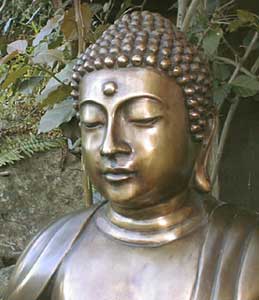Lojong Refresher
Since school is back in session, I think it is time for us to continue with our series of lojong slogans. I thought I'd use the Sunday Sermon this week as a way of doing a refresher on this Tibetan practice. (Ok, ok, I admit that this is a cop-out post. I've got no burning issue to sermonize about right now... or rather there are too many things I'd like to rant about to make a coherent sermon.)
My man B-Money, looking most serene...
In the 12th Century, a Tibetan monk named Chekawa strung together some existing proverbs and aphorisms into a list of 57 slogans called lojong ("mind training"). Meditating on these sayings is called tonglen (in Tibetan 'tong' means 'sending out' or 'letting go' and 'len' means 'receiving' or 'accepting') and it is a way to take full responsibility for your experience of the world. Some members of the Flock have found these slogans useful to them, and I hope you will all give them a chance to work on your mind.
Here are the preceding posts:
Lojong #1 First, train in the preliminaries.
Lojong #2 Regard all dharmas as dreams.
Lojong #3 Examine the nature of unborn awareness.
Lojong #4 Self-liberate even the antidote.
Lojong #5 Rest in the Nature of alaya, the Essence.
Lojong #6 In Postmeditation, Be a Child of Illusion.
Lojong #7 Sending and Taking Should Be Practiced Alternately.
Lojong #8 Three objects, three poisons, and three seeds of virtue.
Lojong #9 In all activities, train with slogans.
Now that we are caught up, we turn to:
#10) Begin the Sequence of Sending and Taking With Yourself.
Pema Chodron:
"What you do for yourself - any gesture of kindness, any gesture of gentleness, any gesture of honesty and clear seeing toward yourself - will affect how you experience your world. In fact, it will transform how you experience the world. What you do for yourself, you're doing for others, and what you do for others, you're doing for yourself. When you exchange self for others in the practice of tonglen, it becomes increasingly uncertain what is out there and what is in here.
Start where you are. This is very important. Tonglen practice (and all meditation practice) is not about later, when you get it all together and you're this person you really respect. You may be the most violent person in the world - that's a fine place to start. That's a very rich place to start - juicy, smelly. You might be the most depressed person in the world, the most addicted person in the world, the most jealous person in the world. You might think that there are no others on the planet who hate themselves as much as you do. All of that is a good place to start. Just where you are - that's the place to start."
Geshe Dhargyey & Geshe Rabten:
"Until now, our sole consideration has been for our own benefit and happiness, and this has prevented our feeling genuine concern for others. Therefore, at first we may experience some difficulty in imagining or thinking about taking on the suffering of all other beings. We should begin the meditation by accepting all the difficulties that may happen to us today, tomorrow, and on into the next life. Although the prime object of giving and taking is to accept the misery of others, we train our mind by imagining our own immediate suffering. Only after our mind has become accustomed to this do we begin to take suffering from others. Just as a person who wishes to scale Mount Everest will first train on the lesser peaks, so should we practice on our own selves first."
Linus Furious:
"This seems a bit obvious on first glance. We might think, "Of course you should start with yourself - who else could you start with?" but I think what this slogan points at is our tendency to see the external much more clearly than we see the internal. We cannot take on the misery of the world until we face our own misery - and sometimes that is a huge task. Be kind to yourself, and you will begin to feel a kindness toward others. (Note that being kind is not the same thing as being indulgent...)"
If you missed the explanation of the lojong sayings and tonglen meditation, click here.
Go in Peace.
Sunday Sermon
Subscribe to:
Post Comments (Atom)




0 comments:
Post a Comment